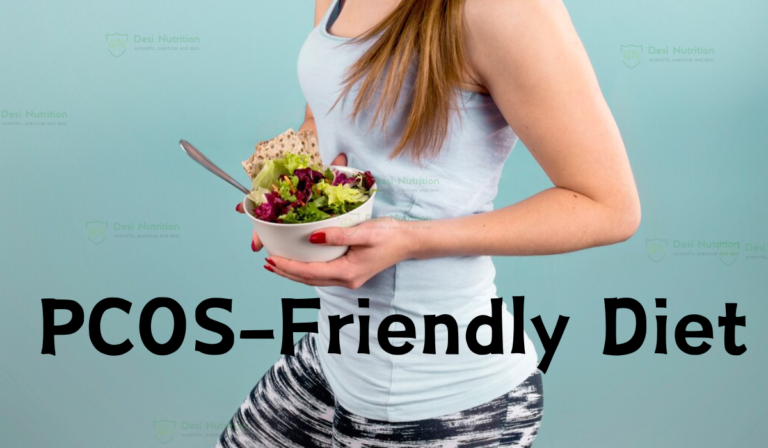Polycystic Ovary Syndrome (PCOS) is a condition that affects many women leading to a wide range of symptoms such as irregular periods, weight gain, acne, and fertility issues. While the exact reason for PCOS is unknown, one can manage PCOS by making a few lifestyle changes, particularly diet. In this article we will explore the importance of planning a PCOS-friendly diet and how to do it.
Step 1: Understand the Role of Nutrition in PCOS

First of all you need to understand the role of nutrition in managing PCOS symptoms. One of the major changes that women with PCOS have to do is change their dietary approach. They do not have to follow a strict diet but ensure to consume food that helps manage the symptoms.
Understanding nutrition will help you make the right food choices. Women with PCOS often struggle with insulin resistance where the body doesn’t use insulin effectively. They will experience high blood sugar levels which leads to weight gain and increases the risk of type-2 diabetes.
Women with PCOS can manage blood sugar levels by ensuring they consume a balanced diet. They need to add food with low glycemic index that can help maintain the blood sugar. Include foods that help to reduce inflammation which is a common issue in women with PCOS.
Step 2: Focus on Whole Foods

A PCOS friendly diet begins by adding whole foods in your diet. The whole foods are nutrient dense and would ensure to meet your body’s need of various nutrients. Whole foods are essential for a PCOS diet because they are unprocessed and contain minimal added sugar or unhealthy fats, making them an ideal food option to manage your blood sugar levels.
The foods that you need to include are:
- Whole Grains: You need to opt for quinoa, brown rice, oats, and whole wheat products instead of refined grains like white bread and pasta. Whole grains are rich in fiber, which helps regulate blood sugar levels and promotes healthy digestion.
- Fruits and Vegetables: Fruits and vegetables should make up the major part of your diet. Along with being rich in many nutrients including various vitamins and mineral, fruits and vegetables are rich in antioxidants and fiber. Antioxidants help to reduce the inflammation and fiber helps to release insulin slowly ensuring there are no sudden spikes in your blood sugar levels.
- Lean Proteins: Your body needs protein so you need to ensure to consume lean protein sources like chicken, turkey, tofu, and fish. Go for plant-based protein sources like beans, lentils, chickpeas etc.
- Healthy Fats: All the three macronutrients are essential for your body. So make sure you choose foods like avocados, olive oil, nuts and seeds that are a rich source of healthy fats.
Step 3: Limit Processed and Sugary Foods

To stabilize or manage your blood sugar levels, you need to limit the intake of processed and sugary foods. Eliminate or limit sugary snacks, and beverages that can spike your blood sugar levels which can worsen the symptoms of PCOS.
- Avoid Sugary Drinks: Eliminate sodas, energy drinks, and even fruit juices because they can contain high amounts of sugar. Stick to water, herbal teas, or infused water for hydration.
- Limit Refined Carbohydrates: Refined carbohydrates lead to spikes in your blood sugar levels, so limit the intake of foods like white bread, pastries, and sugary cereals have little nutritional value and can cause rapid blood sugar spikes.
- Watch Out for Hidden Sugars: Packed foods often have hidden sugars in them. You need to make the right choices. Ensure to read the labels to figure out the hidden content in the packages. Avoid foods with high fructose corn syrup, dextrose or other sugar adjectives.
Step 4: Manage Portion Sizes

PCOS might lead to weight gain. To manage your weight you should focus on your portion sizes. Therefore, what you eat and how much you eat should be your priority to manage PCOS symptoms. A balanced meal with small portion sizes can help regulate insulin levels and prevent overeating.
- Use Smaller Plates: Using smaller plates is a trick for your brain to think that you’re eating enough. Foods in smaller plates will help you to manage your portion sizes and prevent overeating while enjoying a variety of foods.
- Mindful Eating: Mindful eating is your key to prevent unnecessary intake of food. Pay attention to your hunger cues– when you are hungry, when you feel full etc. Savor the taste of food with every bite. This can help prevent overconsumption and allow your body to signal when it’s full.
Step 5: Plan Balanced Meals
Women with PCOS need to understand that they need essential nutrients that help maintain their overall health and prevent hormonal imbalance. Ensure to consume a meal which is balanced in respect with nutrients. Incorporate all the three macronutrients—carbohydrates, fats and protein. A balanced meal helps regulate blood sugar levels and keeps you feeling full for longer periods.
- Include Protein in Every Meal: Protein is an essential macronutrient not just because it is the building block of your muscles but it also helps to stabilize blood sugar levels. Aim to add a source of protein with every meal, whether it’s eggs, lean meat, or plant-based options like legumes or tofu.
- Add Fiber: Fiber-rich food helps you to feel full, slow down digestion, release energy slowly and prevent any spikes in blood sugar. Foods like vegetables, whole grains, and legumes should be your fiber-rich food options.
- Healthy Fats: Incorporate healthy fats into your meals for a balance of macronutrients. For example, add a tablespoon of chia seeds or flaxseeds to your morning smoothie or top your salad with avocado slices.
Step 6: Incorporate Anti-Inflammatory Foods

You need to include foods with anti-inflammatory properties so they can help curb the inflammation which is common in women with PCOS. Choose foods with natural anti-inflammatory properties to help reduce inflammation in your body.
- Omega-3 Fatty Acids: fishes are a rich source of omega-3 fatty acids. Incorporate foods like salmon, and other foods like walnuts, and flaxseeds that can help reduce the inflammation.
- Turmeric: The common household Indian spice, turmeric has curcumin which makes it a powerful antioxidant. Add turmeric in your milk, curries or other dishes to get its medicinal benefits.
- Berries: Blueberries, strawberries, and other berries are packed with antioxidants that fight inflammation and protect cells from damage.
Step 7: Time Your Meals and Snacks

The timing of your meal also plays a significant role in managing PCOS symptoms. Consuming meals on a fixed time regularly helps to maintain blood sugar levels and insulin resistance. Try to eat meals on regular intervals to prevent blood sugar spikes and crashes.
- Eat Regular Meals: Try to fit 3-4 meals in your whole day with smaller portion sizes. Add healthy snacks in between your whole meals. Do not tend to skip meals or else it can lead to overeating later in the day. This can negatively impact your blood sugar levels.
- Incorporate Healthy Snacks: Healthy snacks in between meals can help you manage your hunger. Try to opt for healthy snacks like a handful of nuts, carrot sticks with hummus or a piece of fruit. Avoid turning to processed snacks like chips and cookies.
Step 8: Stay Hydrated

Proper hydration is essential for your body as well as managing PCOS symptoms. Water helps with digestion, detoxification, and maintaining healthy skin. It also helps curb unnecessary cravings that might arise from dehydration and lead to overeating or consuming processed foods.
- Drink Water Regularly: Drinking water regularly is the key to hydration. Aim for at least 8-10 glasses of water per day. Drink it in intervals instead of large amounts at one time. You can add lemon, cucumber slices, or mint for flavors. You can also opt for herbal teas for hydration.
- Limit Caffeinated Beverages: Ensure to control your caffeine consumption. While 1 cup of tea or coffee is fine, you should avoid caffeine. It should not be a major part of your day because it can lead to hormone imbalance and worsen your situation.
Step 9: Monitor and Adjust
If you want to manage PCOS you need to adjust according to the needs of your body. You need to keep in mind that each person with PCOS is different and has different needs vehicle managing the condition. You should monitor your lifestyle and how your body responds to the changes. Keep track of your meals, symptoms, and energy levels, and adjust your diet as needed.
- Track Your Symptoms: Journaling your food intake and how you feel afterward can help identify triggers or foods that may worsen your symptoms.
- Consult a Dietitian: Consider working with a registered dietitian who specializes in PCOS to tailor your diet plan further and ensure you’re meeting all of your nutritional needs.
Step 10: Focus on Sustainable Changes
Managing PCOS could be effective when you start making sustainable, long-term changes in your diet. If you want to see effective results, focus on sustainability or else your efforts will go in vain. Don’yt go for quick fixes, or restrictive diets that may worsen your situation. Instead focus on creating a balanced and enjoyable eating plan that works for your lifestyle.
Frequently Asked Questions
What is the best meal plan for PCOS?
Ans. A PCOS-friendly diet is all about eating clean food. Include natural and whole foods in your diet. Opt for whole grains, fruits and vegetables, nuts and seeds, and lots of water in your diet. You need to avoid foods like sugary beverages, and foods with preservatives and hidden sugar content. Try to avoid white bread, pastas, white rice to manage blood sugar levels.
Can I eat rice with PCOS?
Ans. You can eat rice in PCOS but not regularly. You have to choose brown rice over white rice and ensure the portion size of the rice you consume. Consuming rice regularly can lead to spikes in your blood sugar levels.
Is paneer ok for PCOS?
Ans. You can consume paneer and other dairy products but make sure you are doing it in moderation. Consuming paneer regularly is not a good decision for people who are looking to manage PCOS.




